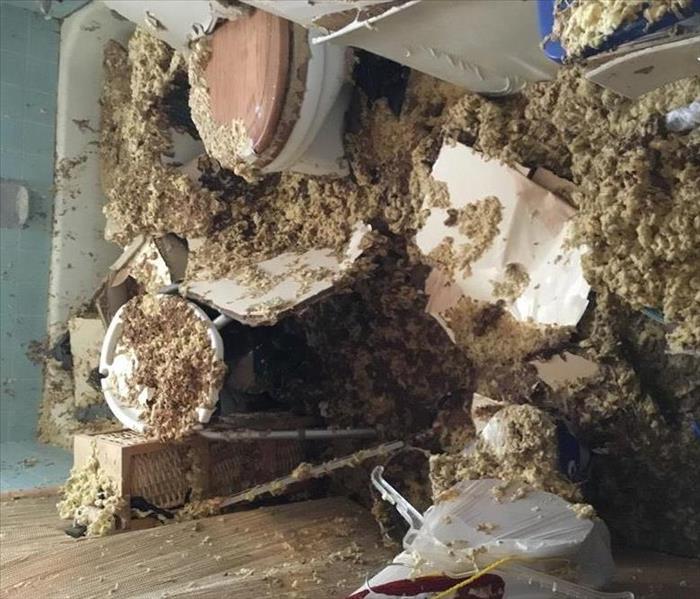5 things you can do to help prevent water damage events at home!
1/11/2019 (Permalink)
No one wants to deal with water flooding issues in the home. Sometimes they are caused by events that are unavoidable and unexpected. There are, however, 5 areas in your home that you can routinely check to help avoid the majority of the water loss jobs we deal with.
1. Check your Toilet supply line and flush valve
The most common causes of water loss/damage that we see are issues with the toilet. Either the supply line has come loose or cracked or the flush and fill valves are not working properly. Faulty flush valves can also cause unusually high water bills when they go undetected. Checking upstairs bathrooms is essential because a flooding issue from an upstairs source will generally affect the upstairs and downstairs area of the home. If you need help with regular maintenance of your toilet, here is a great resource from Fluidmaster (Toilet Upkeep Guide)
2. Make sure that washing machines are installed and working properly
We recently had 2 water extraction jobs here in Mesa, AZ where the washing machine was the cause of loss. In the first case, there was something wrong with the regulator sensor on the washer and the water overfilled the washing tub and filled up the pantry and kitchen in a ton of water and soap. At least the floor was ready to mop after hundreds of gallons of water were extracted. Luckily, we were on site quick enough to extract the water before any damage was done to the house.
In the other case, the installers had nicked the water supply line when installing the washing machine. The issue was not discovered until the first load of laundry was done and the homeowner got a lot more than just a clean load of clothes.
This can also just happen over time. We had an issue where one night we kept walking into the garage and the floor in the laundry room was wet. We cleaned it up thinking the kids had just spilled something. About an hour later we had to go back through and it was wet again. We were baffled. After about an hour of looking for the issue, we found that there was a very small crack in the water supply line that was lightly spraying water out behind and then under the washer.
Luckily we caught it in time. That could have caused some major issues.
3. Make sure your water heater is working properly and doesn’t need to be replaced
Water heaters are one of the most appreciated yet under maintenance household appliance. It usually sits out in the garage, so its, “out of sight, out of mind.” Having a water heater that is not in proper repair can cause high monthly energy bills, rusty water, and can cause severe water damage. Luckily, most of the time the water damage is done to the garage area and does not filter into the home. But a lot of the time it will affect the walls that separate the garage from the home. Because the garage is not a high traffic area, water issues are not discovered right away. That means damage to drywall and usually a breeding ground for mold.
4. Make sure your dishwasher is connected properly
Water issues from dishwashers are usually caught pretty quickly because the kitchen tends to be a high traffic area in most homes. Especially in a home like ours where kids are constantly searching for cookies, juice boxes and granola bars that we try to keep well hidden. We have had a few jobs in the past where people woke-up to kitchen floors fully flooded after leaving the dishwasher to do its work right before heading to bed. Similar to the washing machine, do periodic checks of the water supply line to the dishwasher to make sure there aren’t any loose connections and that the hose is in good condition and not cracking.
5. Make sure water hoses to the fridge are not kinked and are in good condition.
So, any fridge that has an ice maker or water dispenser is obviously going to have some type of water supply line connected to it. We don’t usually see issues from those supply lines because they don’t have the amount of water running through them as other supply lines do. However, we did have one case where a property owner called us out to a house where the renter kept smelling an odd smell by the refrigerator and after completely cleaning out it out still couldn’t find the source of the odor. We recognized the smell as a potential mold issue right away. After moving the fridge out of its space, we could instantly see huge water damage and mold issue that was infecting the whole drywall and cabinet area that was around the fridge. It was caused by a crack in the water supply line.
So, there is really no way to totally eradicate the possibility of having a water loss on your property. Weird things happen every day. Hopefully, they don’t happen all that often. But checking these 5 areas on a quarterly basis can help to avoid major water issues. One of the reasons this is so important is that Homeowners Insurance policies are generally very specific about what they will and won't cover. Most of the people we deal with just assume that since they have insurance they are good to go. Insurance mostly only covers water losses where the loss was caused by a sudden and unexpected event. So, a slow leak here or there or an issue where the loss could have been avoided by general routine maintenance are generally not going to be covered by insurance and will have to come out of the property owner’s pocket.






 24/7 Emergency Service
24/7 Emergency Service
